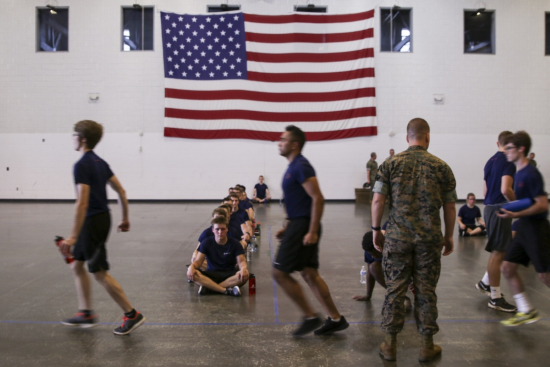Men and women who want to join the most elite fighting force in the world have one choice, the United States Marine Corps.
The transformation from civilian to warrior will be challenging, but the Marine Corps is committed to providing future warriors with the tools to succeed.
The Delayed Entry Program (DEP) was created to provide future Marines with a community to prepare them for the challenges of Marine Corps recruit training.
Related Article – Guide to the Delayed Entry Program (DEP)
Table of Contents
#1. What is a Marine Poolee?

Those who have decided to take the challenge of becoming a United States Marine can postpone recruit training for up to 365 days to get their affairs in order, complete high school, or graduate from college through the delayed entry program.
The term Poolee refers to those who aspire to be a Marine through the DEP.
Enrollment in the DEP gives Poolees the unique opportunities to include:
- Guaranteed Program Placement: Poolees will receive a guaranteed occupational specialty in writing.
- Career Advancement: While in the DEP, you have the opportunity for accelerated promotion, giving you a head start in your career.
- Physical Fitness Training: Marine Poolees will participate in physical conditioning to improve their personal fitness to prepare them for the Initial Strength Test (IST).
- Mentorship: Marine recruiters will provide support and guidance to Poolees to prepare them for the challenge of recruit training.
- Community Support: Poolees are surrounded by a community of aspiring Marines who will gain a sense of honor, courage, and commitment.
Marine Poolees are exceptional examples of what many strive to be but fail to accomplish.
There are strict requirements that civilians need to pass to become a Poolee and eventually a Marine.
Applicants do not officially become Poolees until they swear in at the local Military Entrance Processing Station (MEPS).
Related Article – Future Soldier Program: Your Complete Guide
#2. Marine Poolee Requirements
The United States Marine Corps accepts nothing but the highest quality applicants.
There are several requirements that applicants must accomplish to become Poolees.
Below are the minimum requirements for the delay entry program.
- Must have a high school diploma, GED (accepted on a case-by-case basis), or currently enrolled in high school (They can not attend boot camp until after graduation).
- To enlist, you must be between 17 and 28 and a United States citizen.
- To commission, you must be between 20 and 28, have a bachelor’s degree, and be a United States citizen.
- Must pass a criminal background check with no felony convictions.
- Pass the Armed Service Vocational Aptitude Battery (ASVAB) test.
- All tattoos must fall within the United States Marine Corps tattoo policy.
- Pass medical screening. This helps keep you and those around you safe.
- Must pass a drug test. During the medical screening, a drug test will be performed.
The medical screening ensures that an applicant is in good health and identifies disabilities such as color blindness.
Color blindness is not a disqualifier, but it does prevent applicants from being assigned certain occupational specialties.
If you do not meet the application requirements above, you can still talk to a United States Marine Corps recruiter.
They may be able to apply for a waiver or provide guidance on how to qualify.
Related Article – 10 Benefits of Joining the Military After High School
#3. How To Get Ready For the Marines

Getting prepared for Marine Corps recruit training will look different depending on the Poolee, but there are a few things that all Poolees can benefit from.
Physical Fitness
The Marine Corps has the most challenging physical fitness standards of all the Military forces.
Physical fitness is one of the major concerns for Poolees.
One of the first events of recruit training is the Initial Strength Test (IST), which includes a 1.5-mile run, a plank, and pull-ups or push-ups.
Below are the male minimum requirements:
- 3 pull-ups or 34 push-ups
- 5 mile run in 13:30
- 1:03 minimum plank
Below are the female minimum requirements:
- 1 pull-up or 15 push-ups
- 5 mile run in 15:00
- 1:03 minimum plank
To prepare Poolees for these standards, recruiting offices conduct physical training a couple of times a week.
Applicants do not need to pass the IST to become a Poolee but will need to pass the fitness test before boot camp.
Over the course of the DEP, Poolees will gain physical strength and confidence in their abilities.
Related Article – Marine Corps PFT Standards
Education
Poolees enrolled in high school must keep their grades up to ensure that they graduate on time.
If a Poolee does not graduate on time, their recruit training ship date may be pushed back.
When a ship date is pushed back, the occupational specialty could be taken away, and the Poolee may have to change their specialty to suit the needs of the Marine Corps.
If a sign-on bonus was involved, it might get taken away if the Poolee does not meet the shipping standards.
Finances
A Poolee needs to prepare themselves financially to get prepared for boot camp.
Once recruit training is started, a recruit will not have access to their bank or other financial institutions.
Any services or loans should be placed on automatic payment to prevent past due payments while at recruit training.
Married Poolees need to make arrangements before recruit training because they will not be able to transfer funds to their spouses while in training.
Once the member graduates from recruit training, they are protected by the Servicemembers Civil Relief Act (SCRA).
One major benefit of the SCRA is that any loans a person had before joining are reduced to 6% interest.
Related Article – Benefits Of Joining The Marine Corps
#4. Do Marine Poolees Get Paid?
Poolees do not get paid while in the delayed entry program.
Recruits get paid the day they get to their designated recruit depot.
During COVID-19 lockdowns, there were changes to recruit training, such as a mandatory quarantine period before arriving at the depot.
Technically, these men and women were not recruits yet. They were still Poolees during the mandatory 14-day quarantine. During this quarantine period, Poolees were paid.
However, the mandatory quarantines were lifted in September 2021. Other than this anomaly, Poolees are not paid.
Conclusion
One of the biggest challenges for recruiters is getting applicants past the Military Entrance Processing Station (MEPS).
Honesty is essential to the success of the MEPS process.
Applicants must be honest and upfront about their medical and personal histories to ensure their success.
Once an applicant becomes a Poolee, communication with their recruiter is key to their success. Any changes that may affect their ability to attend recruit training need to be brought to their recruiter’s attention as soon as possible.
Deciding to join the most elite fighting force in the world is a testament to your honor, courage, and commitment to defending the people of the United States of America.
It will be challenging, it will be rewarding, and those who answer the call will be equipped with the tools to transform their lives.
References / Resources
US Military Entrance Processing Command
- 5 Best Jobs for Female Marines - June 20, 2024
- 10 Best Marine Corps Recruiting Videos of All Time - June 20, 2024
- Marine Corps Requirements - June 20, 2024
Originally posted on July 21, 2021 @ 7:17 pm
Affiliate Disclosure: This post may contain affiliate links. If you click and purchase, I may receive a small commission at no extra cost to you. I only recommend products I have personally vetted. Learn more.

